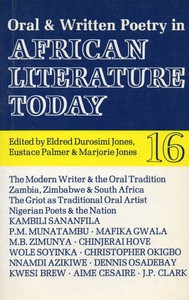 Call for Articles:
Call for Articles:
African Literature Today
Special Issue ‘African Returns
in African Fiction’
This special issue will focus on literary texts by African writers in which the protagonist returns to his/her ‘original’ or ancestral ‘home’ in Africa from other parts of the world. Oxfeld and Long, writing on the ethnography of return suggest that it differs from globalization and transnationalism since ‘it is situated in particular events and experiences’ reflecting ‘particular historical, social, and personal contexts’ (2004: 3). Nevertheless, they go on to state that returns do have an effect not only on the communities the returnee leaves or joins but also on ‘global ways of relating and interacting with one another’ (2004: 3-4). Ideas of return—intentional and actual—have been a consistent feature of the literature of Africa and the African diaspora: from Equiano’s autobiography to Chimamanda Ngozi Adichie’s latest novel, Americanah (2013).
African literature has represented returnees in a range of different positions including feeling located in an ideal home and having a sense of belonging, being alienated in a country they can no longer recognize, or experiencing ‘multi-placedness’, through ‘feeling at home’ but not ‘declaring a place as home’ (Brah, A. 1996: 197). To what extent, then, can the original place be reclaimed with or without renegotiations of ‘home’?
The editors seek articles that explore ideas of ‘return’ to Africa, in fiction and literary non-fiction. Approaches include (but are not limited to):
- Planned, imagined and actual returns
- Return in relation to the local and global
- Constructions and representations of home in relation to return
- Plural identities and multi-placedness.
Articles should be sent to Professor Ernest Emenyonu at eernest@umflint.edu, Helen Cousins at h.cousins@newman.ac.uk and Pauline Dodgson-Katiyo at pauline.dodgson-katiyo@cantab.net
Deadline: 15 September 2015
Articles are reviewed blindly so do not insert your name, institutional affiliation and contact information on the article itself. Instead provide this information on a separate page. Provide also an abstract of your article not exceeding 200 words in a separate file. Both the abstract and personal profile should be submitted with the article but as separate attachments.
Further Guidelines
Length: Articles should not exceed 5,000 words
Format: Articles should be double spaced throughout. Use the same typeface and size throughout the article. Italics are preferred to underlines for titles of books.
Style: UK or US spellings, but be consistent. Direct quotation should retain the spelling used in the original source. Check the accuracy of your citations and always give the source, date, and page number in the text and a full reference in the works cited at the end of the article. Italicise titles of books or plays. Use single inverted commas throughout except for quotations within quotations which are double. Avoid subtitles or subsection headings within the text.
References: to follow series style (Surname date: page number) in brackets in text. All references/works cited should be listed in full at the end of each article, in the following style:
Surname, name/initial, title of work, place: publisher, date.
Surname, name/initial. ‘title of article’. In surname, name/initial (ed.) title of work. Place of publication, publisher, date.
or Surname, name/initial, ‘title of article’, Journal, vol.no.: page no.
>via: http://africainwords.com/2015/08/05/call-for-articles-african-literature-today/
